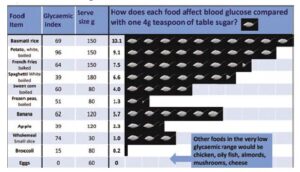Low Carbohydrate Diet for Type 2 Diabetes
by Dr. Lorena Arnez,Consultant in Diabetes and Endocrinology, Diabetes Centre, St Mary’s Hospital
Type 2 diabetes mellitus is mainly caused by the modern way of eating (frequent meals and excess of carbohydrate over the years) and can only be improved with dietary changes. Diet is the most powerful intervention for diabetes and can lead to reduction or withdrawal of medications. Many people manage to have their diabetes on remission which means normal blood glucose levels (or “blood sugars”) without medications with nutritional changes. I believe everyone with type 2 diabetes should know this. One of the easiest ways to improve the blood glucose levels is by reducing carbohydrates (starchy and sugary foods) as they have a direct effect on sugar levels (carbohydrate is absorbed as glucose, which is sugar).
When we reduce our carbohydrate intake our blood glucose levels improve immediately, but most importantly we need less insulin (we need to produce less insulin or to inject a lower dose or no insulin). When insulin is reduced it becomes easier to burn fat and to lose weight. When we lose weight our whole body needs even less insulin to lower glucose in the blood (we become more insulin sensitive) and therefore the insulin levels reduce further and further. Lower insulin levels also reduce appetite. Most people with this approach can rely on their hunger to decide when to eat and don’t need to reduce portions or be concerned about calories to lose weight and control diabetes and this can be quite liberating to many people. Low carbohydrate diet is very well tolerated for most. However, some people may feel weaker or crave carbohydrates in the beginning while they gradually adapt to use fat (instead of glucose) as the main source of energy.
It is important to understand this is only a transient phase and most people feel much more energetic and with be????er mental clarity once they become an effective “fat burner” or “fat adapted”.
The NICE guidelines now support a low carbohydrate diet as an effective way to manage type 2 diabetes. The infographics below, developed by Dr David Unwin, an NHS GP, was approved by NICE and points out that starchy foods are be????er avoided if you have type 2 diabetes. International guidelines, such as the American Diabetes Association, have also reached the conclusion that low carbohydrate is much be????er than low fat diet to improve diabetes.
https://www.nice.org.uk/guidance/ng28/resources/endorsed-resource–sugar-equivalent-infographics-6725426077
https://phcuk.org/wp-content/uploads/2019/05/common-foods-13.05.2019.pdf
Reducing carbohydrates is the easiest and healthiest way to improve diabetes for most, however it is not for everyone and there are other alternatives. For example, for those people that eat plenty of processed foods, switching to whole foods may be enough to reach good blood glucose levels.
Other people may choose to go on a low calorie diet by eating less (i.e.: small portions or less frequently). For a few people meal replacements are a????ractive (“low calorie shakes”) even though it is quite restrictive socially and nutritionally and in many occasions the transition to real foods is difficult and only possible by limiting carbohydrates anyway. Finally, others would say they cannot change their lifestyles and would either want to have medications to “control” their diabetes or to have bariatric surgery which may not be ideal but are valid approaches.
If you want more information about how to reduce carbohydrates to improve type 2 diabetes, I would strongly advise this website: www.dietdoctor.com . It has plenty of helpful tips, visual guides, recipes, videos, etc. Please keep your diabetes nurse or doctor informed about the dietary changes you make as the glucose levels can decrease quite fast and therefore they will need to reduce your medications accordingly.




